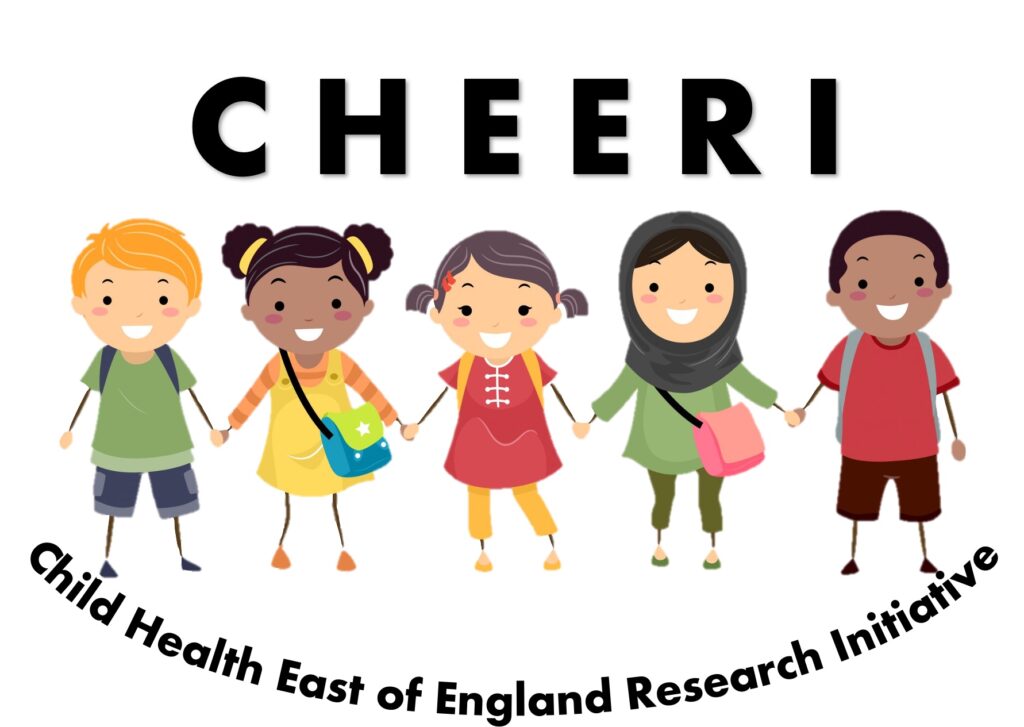Estimated reading time: 5 minutes
Dr Thiloka Ratnaike is the CHEERI Lead and is currently a ST5 paediatric registrar. She graduated with her MBBS from Newcastle University (2013), where she also completed her PhD looking into mitochondrial genome single large-scale deletion disease. Her clinical foundation training was in Oxfordshire, followed by a year out to work in Australia- increasing her clinical experience and understanding of different healthcare systems. However, she missed the ability to undertake research activities, with no academic training pathways being available for Paediatrics in Australia. She successfully applied for a paediatric NIHR-funded academic clinical fellowship in the East of England (EoE) and completed this in 2021 under the guidance of Prof. Chinnery. Since, she has continued her clinical training while juggling a busy family life and is now hoping to acquire post-doctoral funding to continue her research activities.
What is CHEERI?

CHEERI is the Child Health East of England Research (and QI) Initiative- a trainee-led network that aims to overcome geographical barriers to trainees accessing research and QI opportunities, via a central virtual directory and contacts across the region for mentorship.
What motivated you to start up CHEERI?
I have been surrounded by inspiring peers and senior clinicians in the world of clinical academia, and I feel lucky to have had that exposure. I wanted to help other trainees access similar opportunities and started by joining Lizzie Radford- one of these excellent inspiring peers- and her quest to conduct regional Paediatric academic meetings. These were supported by Prof David Rowitch – another inspiring clinical academic, and the head of Paediatrics (University of Cambridge)! We wanted to reach a wider audience, however, the commute to Cambridge amidst busy rotas, meant a lot of trainees could not attend.
I became the RCPCH Trainee Research Network (TRN) representative for EoE and I learnt about the experiences of the three established TRNs. I fed this back to Prof. Rowitch and other leads in the region and suggested we should also have a TRN in the EoE, given our excellent research record. The Covid-19 pandemic meant that virtual meetings became the new norm, and so I embraced this platform to reach out to trainees across the region, unrestricted by distance- the start of our virtual network!
What are the main AIMS of CHEERI?
- To create an accessible database, which is regularly updated with research and QI activity around the region.
- To build a network of people and a central virtual hub of resources, for the training and development of research and QI potential within EoE Paediatric trainees.
- To provide webinars, blogs, and signpost funding opportunities and links to further advice.
What are the main challenges for trainees for getting involved with research and QI?
The biggest challenge facing advancement of Paediatric clinical research is a lack of protected time and the demands on the current workforce.
There is always a small subset of trainees who are passionate about certain projects, and have various motivating factors that lead them to actively seeking opportunities. However, looking at the wider group of trainees, who need to fulfil curriculum outcomes (e.g. understanding how to do critical appraisal of literature), they still face the same barriers – if you’re already busy and exhausted with clinical work, it’s hard to use spare time to get involved with research and QI projects. Often, trainees aren’t aware of the support available, such as their Trust librarians who are an invaluable resource. This is the kind of thing we can help with – for example, signposting what guidance is available or helping create wide-reaching networks for the successful delivery of regional projects.
Why is it important for paediatric trainees to get involved with research and QI?
Ultimately, the aim is to improve patient care. We all need to communicate advances in Paediatric medicine to our patients and their families, and that comes from understanding how the evidence base is created, accessed and critically appraised. This doesn’t mean you are a primary researcher, but you still need to have the fundamental understanding about how research or QI projects are done, and I think that’s the crux of it. Having that understanding can help you to undertake your own projects, utilising management/ leadership/ teamworking/ communication/ creative/ organisation skills – which are great to have, no matter what you decide to go into.
What is the future of CHEERI?
Collaboration! Expansion! Sustainability!
We are hoping to establish a programme in the future which is tailored to trainees with no previous experience in research or QI, to give them the support and resources they may need to get started, and eventually undertake their own projects independently. This includes collaborating with regional Medical Schools and harnessing their guidance.
I’m hoping that as we recruit representatives from all 17 trusts in the region onto the committee, we will be more visible. So, this can provide trainees who may find accessing research difficult, an ‘actual’ person to talk to. From talking within the committee, we are keen to improve equality of access, such as for international medical graduates, who perhaps come from a training programme that didn’t give them much insight into research.
I am actively delegating roles to committee members so they can lead on developing themes- for example, Heba- one of our members, is keen to standardise the delivery of Journal clubs across all Trusts in the region, and this might require virtual workshops encouraging trainees who feel least confident in this area to join. I am very grateful for my committee for expertly delivering the ambition of CHEERI – and we are currently considering how best to keep the process sustainable without protected administrative time.
We are also keen to hear from interested trainees about any ideas they may like to see from CHEERI, so please do get in touch!
